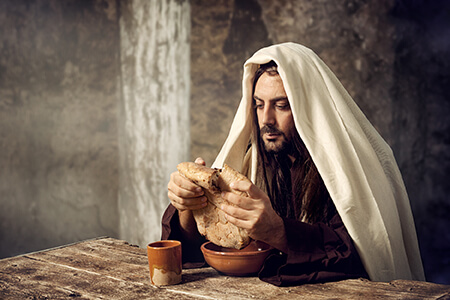 Isaiah 50:4-7
Isaiah 50:4-7
 Philippians 2:6-11
Philippians 2:6-11
 Matthew 26:14-27:66
Matthew 26:14-27:66
The Passion narrative is the climax of the four canonical Gospels which, though diverse in many respects, draw closest to one another at that point. This year's Gospel for Palm (Passion) Sunday is taken from Matthew's account. Through his lens, we see that Jesus' identity varies in relation to the different people He encountered. It is not until after His death that His true identity is revealed.
The Living Bread - “Take and eat, this is my body” (Mt 26:26).
It is for faith, a faith that demands His apostles to rise above human rational senses to perceive His presence in the bread after His death. The bread echoes that of the manna in the desert for the Israelites, a gift of God for physical hunger but now with faith, a spiritual nourishment for His disciples.
To those who are with faith, Jesus is the Living Bread.
The blasphemer/imposter - “He has blasphemed; what further need have we of witnesses?” (Mt 26:65). “Sir, we have remembered how that imposter said, while he was alive . . .” (Mt 27:63).
Does Jesus really blaspheme or is it just an excuse of the high priest to lay charge on Him? In tearing his own garments, the high priest displays his lack of capacity as a high priest, for he himself has forgotten the Mosaic law which prescribed that his clothing should not be torn (rf Lv 21:10). And does the Sanhedrin exercise its religious authority justly in putting Jesus on trial at night and maltreating Him? What an irony to secure the tomb of a dead person if they really believe Jesus is an imposter!
To those who reject Him, Jesus is the blasphemer. To those with a hardened heart, Jesus remains an imposter despite the signs they have witnessed.
The King - “Hail, King of the Jews!” (Mt 27:29); “This is Jesus, the King of the Jews” (Mt 27:37); “If he is the King of Israel, let him come down now from the cross, and we will believe him.” (Mt 27:42).
The second one is a charge against Jesus. Pilate's question to Jesus is whether He has made Himself an earthly king for it could cause an insurrection (rf Mt 27:11). It is the same fear of Herod when the Magi asked about the new born king (rf Mt 2:2). This question of kingship which set in motion a death threat at the very beginning of Jesus' life, finally leads Him to His inevitable death.
The third one is a temptation to test Jesus. It is a reminder of Satan's temptation, “If you are the Son of God, throw yourself down . . .” (Mt 4 6). Daring Jesus to throw Himself down from the temple or come down from the cross is the same trick to entice Him to turn away from doing His Father's will. Instead of using force or miracles, Jesus uses the cross to bring about the new kingdom of God.
To those who are skeptical, Jesus is a “king” of ridicule and contempt. To those who believe Him, Jesus is the King of kings.
The Son of God - “Truly he was the Son of God” (Mt 27:54).
To those who open their hearts and eyes, the true identity of Jesus is revealed.
Dear friends, Holy Week has begun, Jesus is entering into Jerusalem; as His disciples, are we ready to accompany Him and point out His true identity to others?
